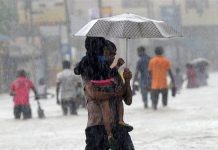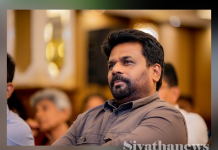Former US Ambassador to the United Nations Samantha Power says that Sri Lanka will have to insist that Facebook uphold its ‘Community Standards’ for all of Sri Lanka’s national languages, or face serious repercussions.
“It is simply not acceptable that Facebook has not invested more in equipping itself to monitor posts in languages like Tamil or Sinhala,” she said.
She made these comments addressing an event to mark 30 years of parliamentary politics of Minister Mangala Samaraweera, at the BMICH on Thursday (28).
Delivering the keynote address at the event organized under the theme “30 Years of daring to Dream – Khema’s boy”, the former diplomat said that Mangala is one of the most remarkable people she encountered during her eight years serving in the US government.
Power, who served as the US Ambassador to the United Nations during the Obama administration, stated it was Mangala who spearheaded the privatization of Sri Lanka’s telecommunications industry when he was Minister of Post and Telecommunications.
She stated that this initiative introduced competition for the first time and knocked down barriers between the privileged Sri Lankans who had phones and those who had to wait as long as seven years to get one.
“Today Sri Lanka has one of the highest number of phones per person in all of Asia, and, despite being a country of 21 million, Sri Lanka is apparently home to 34 million cell phone subscriptions,” she said.
Samantha Power pointed out that this progress has been absolutely essential as a foundation for economic investment and growth.
“However, for all of the good we know technology can do, rapid advances in fields from social media to AI to automation are also posing profound risks to our democracies. These tools are going to be decisive in global development going forward, but governments must confront their dark uses as well as their boundless possibilities.”
“I believe we need to dramatically increase our scrutiny of the effects of new technologies.” She stressed that will require fresh thinking, critical perspectives, and bold steps by policymakers to find a better balance than we currently have—a balance that takes into account the impact that tech is already having on politics and human rights.
“In the United States, in the wake of Russia’s interference in our elections, and because of the deep divisions in our society, we are seized with the question of how falsehoods and echo chambers enabled by social media impact our domestic politics,” she said.
But these platforms also have potentially deadly impact when it comes to the rights and well-being of marginalized groups, Power said.
The UN, for example, has found that the spread of violent hate speech and falsehoods on Facebook in Myanmar played a “determining role” in the mass atrocities perpetrated against the Rohingya.
From the Philippines to India to Mexico to Indonesia, technology that barely existed 15 years ago is being used to scapegoat vulnerable populations, exacerbate societal cleavages to the point of violence, and empower the most extreme voices, she said.
“Last year, here in Sri Lanka, after hate speech and conspiracy theories about Muslims disseminated on social media led to violence and destruction, one of your government officials made a profound observation that I believe the entire world must heed: ‘The germs are ours, but Facebook is the wind.’ ”
She said Minister Mangala Samaraweera himself was one of the first political leaders to take to Twitter during the crisis to condemn the viciousness, sending a clear message of zero tolerance for politicians and others who incited racial violence.
“In societies like ours – with mixed ethnicities and religions, with free speech and extreme voices – we ignore this reality at our peril.”
Power said she cannot overstate the impact of social media platforms. Despite going worldwide just 13 years ago, “Facebook has as many adherents as Christianity.”
Thinking about it another way: at its height in 2018, Facebook was worth more than the economies of 167 countries in the UN – that is more than 85% of nations in the world!
She said that here in Sri Lanka, apparently some 6 million people regularly use Facebook. This will surely grow as mobile technology becomes cheaper and more widespread. Asia is already the company’s fastest growing market. And when you include the total percentage of people who use WhatsApp, YouTube, Twitter, and even newer platforms, you are already talking about a significant portion of the population.
The ex-diplomat said that when it comes to companies like Facebook, Twitter, and Google, which failed for too long to grapple with the dangerous uses and effects of their products, it does now finally seem that they are seized with the abuses that their platforms have enabled.
She said these companies need to prioritize contributing to the health of democracy as a goal, right alongside making yet more money.
Power said she was encouraged to hear that Facebook has committed to serving up to 20,000 Sri Lankan children in a digital literacy program to be run this year, and that they are participating in the Information and Communication Technology Agency’s SMART Social Circles initiative, which aims to prepare people to better discern.
This is important, she said, adding that the education and leadership of well-rounded, tech-savvy and civic-minded young people is going to be critical to reigning in the negative effects of new technologies.
“However, given the human consequences, this is a drop in the bucket. We need to think far bigger.”
In the US, Power said she would like lawmakers and policy leaders to think about a number of approaches including instituting regulations and heavy fines for failing to remove hate speech.
She said governments like Sri Lanka also have an essential role to play. “You are going to have to insist that Facebook uphold its “Community Standards” for all of Sri Lanka’s national languages, or face serious repercussions.”
“It is simply not acceptable that Facebook has not invested more in equipping itself to monitor posts in languages like Tamil or Sinhala.
A platform with this much influence and reach cannot get by just doing the bare minimum—Facebook needs to be far more transparent, so that experts and civil society can guide the company in how to do better in the context of the unique challenges Sri Lanka faces.”
As always, talking about technology is complicated – many countries would like nothing more than to have the grounds to regulate social media and the internet or to enhance censorship and surveillance—not to protect their people, but to protect themselves from scrutiny.
Ministers and MPs including Prime Minister Ranil Wickremesinghe, Opposition Leader Mahinda Rajapaksa, former President Chandrika Bandaranaike Kumaratunga,R. Sampanthan, public servants, diplomats and other dignitaries were present on this occasion.
President Maithripala Sirisena, Prime Minister Ranil Wickremesinghe, Opposition Leader Mahinda Rajapaksa, former President Chandrika Kumaratunga, MPs from various political parties, public servants, diplomats and other dignitaries participated in the event.
















